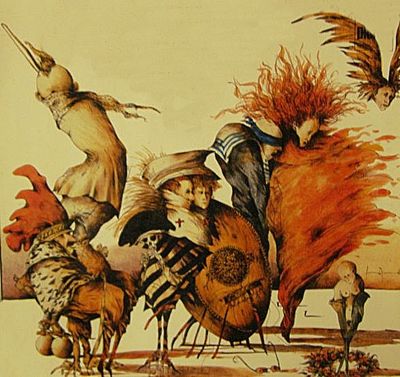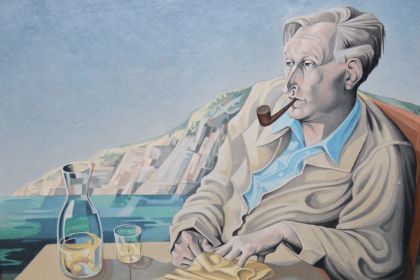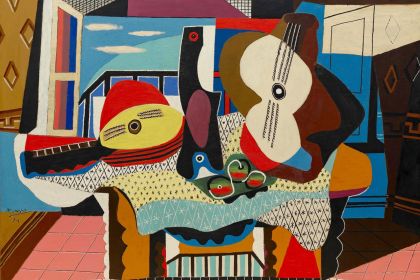Collaboration
Shakespearean characters expressed through atonality in atypical guitar sonata by Hans Werner Henze

Royal Winter Music LP
Royal Winter Music is one of the most atypical works for classical guitar that reveals incredible possibilities of the instrument and requires a serious technical level from guitarists. Written by the German composer Hans Werner Henze between 1975 and 1976, Royal Winter Music is described as a sonata for a solo guitar in six movements where each piece is designed to reflect one of the characters from the works of Shakespeare.
Hans Werner Henze found inspiration to create such a large-scale guitar work from Julian Bream, the greatest guitarist of our time whose efforts to fill the guitar repertoire with modern pieces have resulted in collaboration with prominent composers from around the world including Benjamin Britten, Leo Brouwer, Toru Takemitsu, William Walton, and Peter Maxwell Davies.
The first piece of Henze's Royal Winter Music titled Gloucester refers to the famous monologue “Now is the winter of our discontent” recited by the young Richard, Duke of Gloucester, in the opening line of Shakespeare’s Richard III.
The phrase "winter of our discontent" is widely quoted to tag political and social unrest since the word "winter" is a powerful metaphor for a bleak and discouraging period of time while "discontent" suggests restlessness and a looming threat. Henze was known for his strong dissatisfaction with the right-wing political system, so it is not surprising that the iconic Shakespearean line sets the mood for the entire sonata.
Listen to Gloucester from Royal Winter Music performed by Julian Bream:
In Gloucester, the composer already sets the general concept of the guitar sonata by combining classical writing with the influential atonal techniques of the time which demonstrates how extremely unusual a classical guitar might sound. A truly innovative score even contains sudden percussion patterns performed by Julian Bream on the guitar body.
The second piece is dedicated to Romeo and Juliet, the most popular Shakespearean tragedy about two young lovers whose deaths ultimately reconcile their feuding families.
Listen to Romeo and Juliet from Royal Winter Music performed by Julian Bream:
The third piece depicts a flighty structure of Ariel, the airy spirit from one of the last Shakespeare plays The Tempest. Here, the musical atmosphere changes as quickly as Ariel flies through the air and constantly transforms her shape. She can be furiously stormy, suddenly melancholy, cold, or ironic.
Listen to Ariel from Royal Winter Music performed by Julian Bream:
The fourth piece portrays Ophelia, Hamlet's beloved who during the narrative constantly faced cruelty, conspiracy, and murder which finally led her to lose her mind and drown herself in the river. Ophelia's tragic death is echoed with the coda of the fourth piece, so similar to water ripples.
Listen to Ophelia from Royal Winter Music performed by Julian Bream:
A rather rhythmic fifth piece, entitled Touchstone, Audrey and William, outlines a love triangle of the pastoral comedy As You Like It. Here, the Touchstone court jester vies with the silly country boy William to win the sympathy of the village girl Audrey. To more clearly describe the emotions inside the trinity, Henze assigns each character his own compositional technique. So, the cunning Touchstone is performed with virtuoso arpeggios, Audrey's tenderness corresponds to elegant triplets, and William comes onto the scene with jolly staccato melodies.
Listen to Touchstone, Audrey and William from Royal Winter Music performed by Julian Bream:
The character of the final piece is the fairy king Oberon from the comedy A Midsummer Night's Dream. Since the events take place in the night forest, this piece is nocturnal in nature and contains musical inclusions as well as altered motives of the previous five plays as it is supposed to be in a closing sonata.
Listen to Oberon from Royal Winter Music performed by Julian Bream:
To realize such a grandiose idea of writing a truly modern and dodecaphonic work for classical guitar, Henze and Bream spent many hours in composer's estate near Rome discussing the score, nuances of guitar technique as well as playing badminton on the front lawn.
In 1976, Bream himself played the premiere of Royal Winter Music in Berlin to the general approval of both critics and listeners.
Three years later, Henze finished Second Sonata on Shakespearean Characters in three movements, dedicating this work to Bream.



